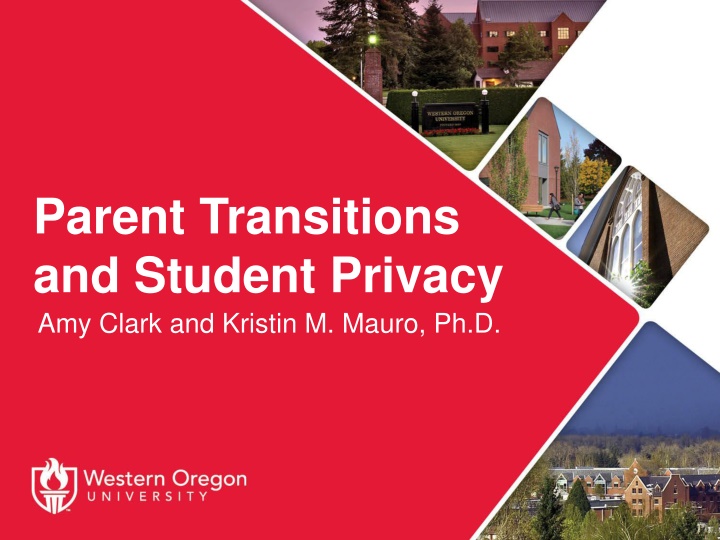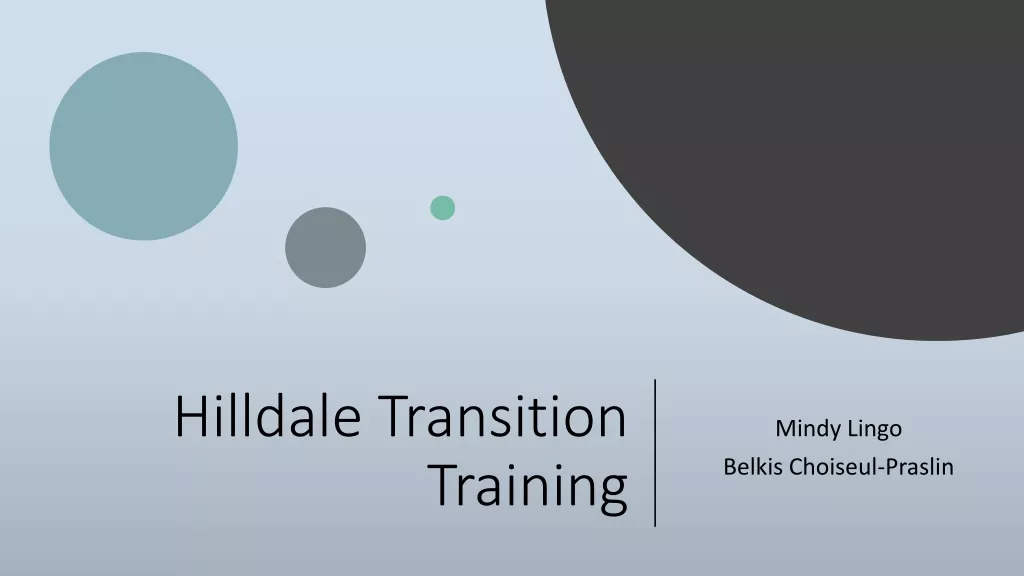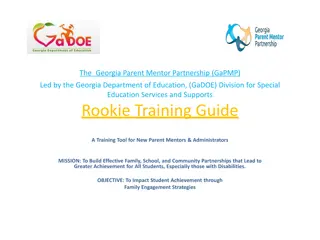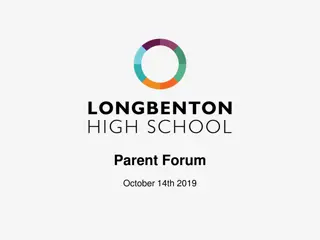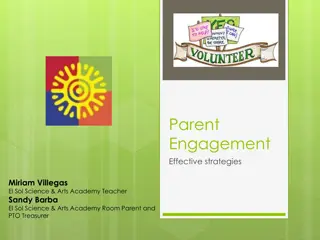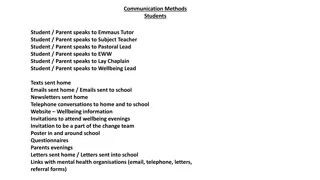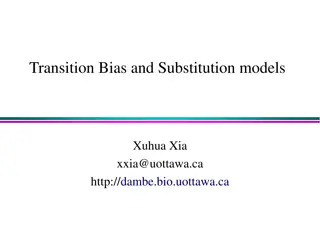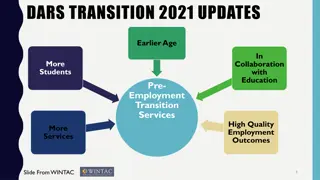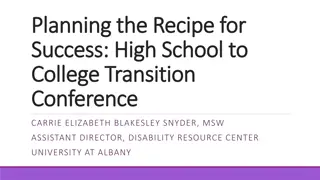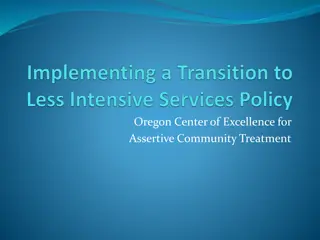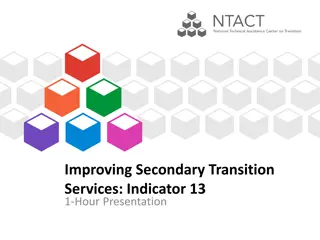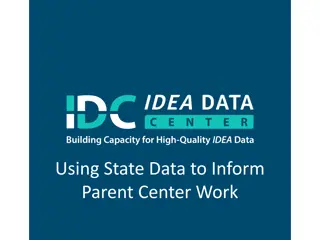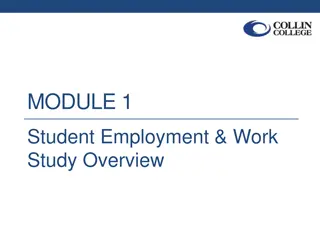Supporting Your Student's Transition to College: A Parent's Guide
Providing valuable information on how parents can support their students' transition to college, this presentation emphasizes the importance of understanding student privacy laws, fostering healthy parent involvement, and being a partner in your student's success. It covers topics such as the parent-student relationship, campus resources, student learning outcomes, and the student life cycle, offering practical advice and guidance for parents navigating this significant transition period.
Download Presentation

Please find below an Image/Link to download the presentation.
The content on the website is provided AS IS for your information and personal use only. It may not be sold, licensed, or shared on other websites without obtaining consent from the author.If you encounter any issues during the download, it is possible that the publisher has removed the file from their server.
You are allowed to download the files provided on this website for personal or commercial use, subject to the condition that they are used lawfully. All files are the property of their respective owners.
The content on the website is provided AS IS for your information and personal use only. It may not be sold, licensed, or shared on other websites without obtaining consent from the author.
E N D
Presentation Transcript
Parent Transitions and Student Privacy Amy Clark and Kristin M. Mauro, Ph.D.
Why were here: The purpose of this presentation is to provide information that will position you to best support your student in their transition to WOU. This is an opportunity to learn about the student life cycle at the university and how you, as a parent can, provide timely support. To that end we will provide guidance on navigating student privacy laws.
Parents are Important to College Success and Transition While your role will change over time, you are an important ally in your students successful transition to WOU. Parents can help students succeed when they understand and support our messages. Students relationships with their parents play a integral role in promoting development and academic success throughout college. Strong parent student relationships and communication can promote healthy decision making and successful transition to adulthood.
How You Can be a Partner in Your Students Success Families contribute to student success by: Understanding the student experience Knowing campus resources Supporting WOU s goals for student learning outcomes Empowering your student to take responsibility and make decisions Providing appropriate support while respecting student privacy
Healthy Parent Involvement While separation can be difficult, to foster independence it is important for parents to: Let your student call or text you Provide advice, but let your student resolve disputes (e.g. roommate, social, etc..) Embrace the role of educator when it comes to helping your student manage their finances Encourage your student to engage in activities that are personally and academically rewarding Be an ally and teacher by teaching your student how to advocate for themselves (a valuable lifelong skill)
The Student Life Cycle What to ask your student and when. September October November December
What to ask in September How is living on campus or commuting? How are your professors? Which one(s) are your favorite? Least favorite? Why? Are you staying organized? If working, how flexible is your schedule? What are the important deadlines for this term? Are you involved in any student organizations?
What to ask in October Are you struggling in any of your classes? Have you talked to your faculty during office hours? How are you adjusting to your roommate? Have you been checking your university email regularly? Are you responding to emails from faculty, advisors, etc ? Are you keeping up with your finances? When is your next advising appointment? Have you completed a four-year plan with your academic advisor?
What to ask in November How did your mid-terms go? Have you talked to your advisor about next term? Have you planned a schedule for next term? Do you have a plan B schedule? Are there any holds on your record? How are grades currently in your classes?
What to ask in December What are you enrolled in for winter term? Are you taking care of yourself? Managing your stress going into final exams? For winter term, are you wait-listed for any courses or do you plan on changing your schedule? When is your last final exam? What all are you bringing home with you? Are there items you no longer need? Items you need? Do you know how to calculate your GPA in college? If not, ask your advisor.
Federal Educational Rights and Privacy Act (FERPA) Amy Clark, University Registrar
What is FERPA? First and foremost, it is a federal law that university staff are required to uphold! The Federal Educational Rights and Privacy Act was enacted in 1974 as a means of protecting student records and restricting the use of those records to legitimate educational purposes. It has been amended over the years, but the central tenets of the legislation have remained consistent. The Registrar serves as the custodian of student records for WOU.
Directory vs. Non-Directory FERPA allows WOU to designate some information as directory , meaning that it can be released without prior authorization from the student. Information not designated as directory is by default non-directory information. Non-directory information cannot be released to anyone but the student without prior authorization.
Examples of Directory and Non-Directory Information The following is a list of examples, but is not an exhaustive list. See the entire Student Records Policy at: https://www.wou.edu/registrar/students-records- policy/ Directory examples: Dates of enrollment Earned credit hours (Not Grades) Class level and academic program Degrees, honors, certificates, applied for or awarded Enrollment status (full- time, half-time, less than half-time) Non-Directory examples: GPA or grades Academic standing or eligibility to return to school Transcripts Class schedule Unmet degree requirements for graduation Medical or Counseling records
Confidentiality clause: FERPA allows students the right to restrict the release of their directory information, by electing to place a confidentiality restriction on their record. No information of any kind can be released for a student that has elected to place a confidentiality restriction on his/her record. It is very uncommon for students to take this step, but be aware it is possible.
Who does FERPA apply to? Persons of any age who attend a postsecondary educational institution that receives federal funding. 20 U.S.C. 1232g(a),(d); 34 C.F.R. 99.3. A.K.A. any and all WOU students as of the time they enroll in a course.
How does FERPA apply to parents? FERPA and Oregon Law prohibits university officials from releasing non-directory information to anyone without written consent. This applies to all students, even those under the age of 18. So no information? Not necessarily. Talk to your student. They have access to everything and can tell you all about their academic record. What about sharing their login information? No, that is a violation of university policy.
How do you as a Parent work with FERPA: Foster good communication with your student. Your student has the right to share their information with you. A good open relationship encourages them to do that. Help your students to help themselves. Understand that university employees are complying with the law when they decline to provide restricted information.
Thank you! We appreciate that you took the time to be with us today and look forward to working with you during this transitional time and throughout your child s academic career. Questions?
